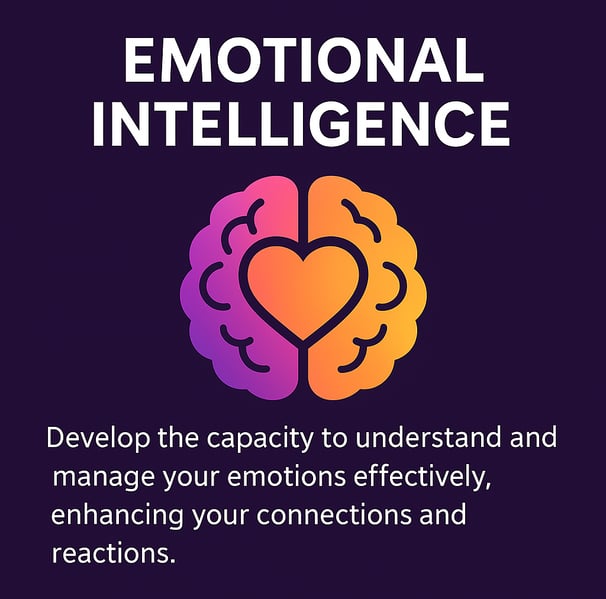Level 2 - Emotional Intelligence
Level 2: The 100 Expanded Emotional Intelligence Insights
Emotional Intelligence
Emotional intelligence is the heart of every meaningful connection. It’s the ability to understand what you're feeling, manage your emotions with clarity, and respond to others with empathy and care. DREAM helps you build that capacity—not just to cope, but to thrive.
Whether you're navigating conflict, calming anxiety, or reaching for deeper self-awareness, DREAM offers gentle guidance to help you recognize your patterns, regulate your responses, and grow in emotional wisdom.
Emotional intelligence starts with self-reflection.
Emotional pain is a signal, not an identity.
Knowing your triggers prevents reactive behavior.
Emotional resilience is built through discomfort, not avoidance.
Self-compassion allows greater compassion for others.
Trust is earned through emotional consistency.
Miscommunication is often emotional, not logical.
Emotional intelligence is a skill, not a fixed trait.
Feelings fluctuate, but values provide stability.
Recognizing emotions in real-time enhances control.
Curiosity about emotions leads to greater understanding.
Not all emotions need an immediate response.
Naming an emotion reduces its intensity.
Emotional contagion influences group dynamics.
Empathy without boundaries leads to burnout.
People express emotions in vastly different ways.
Asking “What do I feel?” is more powerful than assuming.
Silence can be a sign of emotional overwhelm.
Emotionally intelligent people own their mistakes.
Emotionally reactive people often feel unheard.
Defensiveness is an indicator of unresolved emotion.
Holding space for others fosters emotional safety.
Regulating emotions prevents emotional projection.
Non-verbal cues reveal more than spoken words.
Anger is often a secondary emotion masking pain.
Emotional suppression leads to delayed outbursts.
Emotions are neither good nor bad—they just are.
Thought patterns shape emotional experiences.
Unprocessed grief manifests in unexpected ways.
Repeated emotional patterns indicate deeper needs.
Emotional avoidance is a short-term fix with long-term costs.
Seeking validation is natural but should not drive self-worth.
Emotional maturity includes accepting uncomfortable truths.
Overexplaining often stems from a fear of misunderstanding.
Regret is a sign of growth, not failure.
Shutting down in conflict is an emotional defense mechanism.
Understanding does not mean agreement.
Some emotions require solitude to process.
Self-soothing techniques are essential for regulation.
Perfectionism is often rooted in emotional fear.
Letting go is a process, not a single decision.
People reveal their emotions through small actions.
Emotions influence memory and perception.
Self-acceptance improves emotional resilience.
Suppressing emotions can impact physical health.
Emotional intelligence requires situational flexibility.
“I feel” statements reduce conflict in communication.
Boundaries protect emotional well-being.
Emotional intelligence includes reading micro-expressions.
Emotional literacy allows for deeper self-expression.
The way we handle emotions influences others around us.
Gratitude can shift emotional states quickly.
Admitting emotional struggles normalizes vulnerability.
Conflict resolution starts with emotional regulation.
People hear tone more than words in emotional moments.
Stress lowers emotional awareness—self-care restores it.
Journaling emotions enhances clarity and processing.
Emotional detachment can be a trauma response.
Patience with emotions fosters long-term understanding.
Acknowledging emotional triggers diffuses them.
Deep breathing slows emotional reactivity.
People seek emotional validation before logic.
Emotional generosity creates deeper connections.
Emotional wounds need acknowledgment before healing.
Unmet needs often manifest as negative emotions.
Empathy requires effort in emotionally charged situations.
The energy in a room is an emotional cue.
Emotional intelligence prevents cycles of reactionary behavior.
Overanalyzing emotions can lead to emotional exhaustion.
Checking in on others fosters emotional awareness.
Responses should be adjusted based on emotional states.
Inner dialogue affects outward emotional expression.
Emotionally intelligent leaders inspire loyalty.
People mirror emotional states—positivity is contagious.
Holding emotional space for others prevents assumptions.
Compassion is understanding without needing to fix.
Emotional resilience is developed, not innate.
Fear is often masked as control or avoidance.
Past emotional wounds shape present reactions.
Emotional intelligence includes knowing when to disengage.
Reading between the lines enhances emotional insight.
Emotional exhaustion leads to reduced empathy.
People remember how you made them feel, not what you said.
Emotional wisdom includes managing expectations.
Honoring emotions builds long-term trust.
Responding with curiosity defuses emotional tension.
Small gestures carry deep emotional meaning.
Adapting emotional expression to context is key.
Confidence in emotions leads to self-trust.
Learning to receive kindness deepens emotional well-being.
The best emotional responses are often the simplest.
Emotional intelligence means knowing when to pause.
Some emotions can only be understood through experience.
Expressing emotions without blaming strengthens relationships.
Personal growth requires emotional discomfort.
Reacting emotionally is not the same as responding wisely.
Mindfulness enhances emotional awareness.
Emotions are a compass, not a command.
The ability to forgive reflects emotional intelligence.
Emotional intelligence is a lifelong journey, not a destination.


© 2025. DREAMHEALER.ORG All rights reserved.
